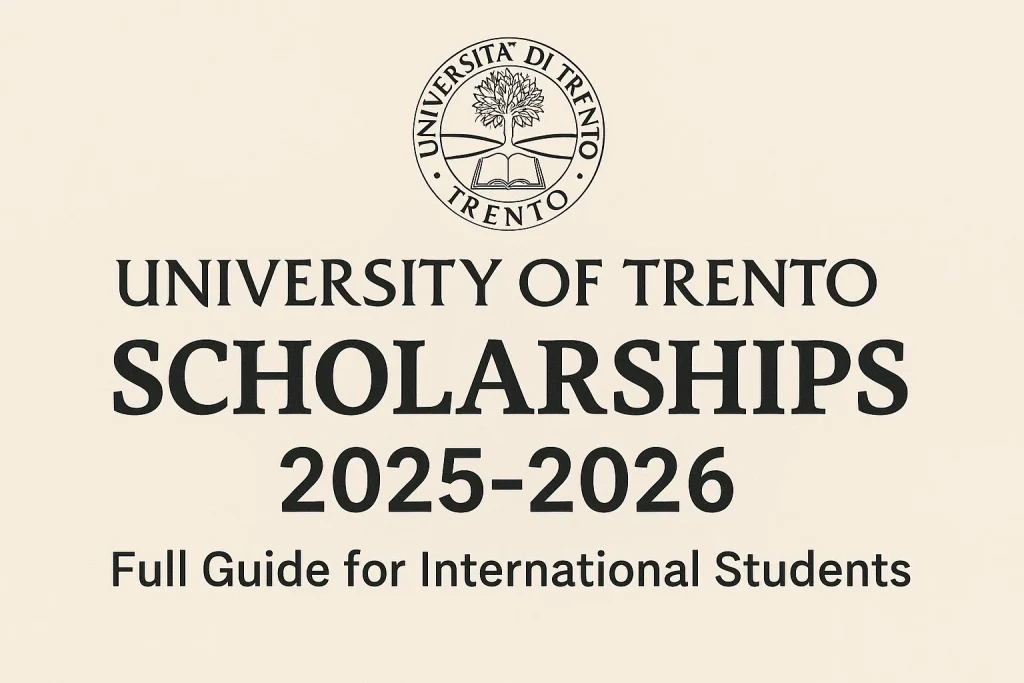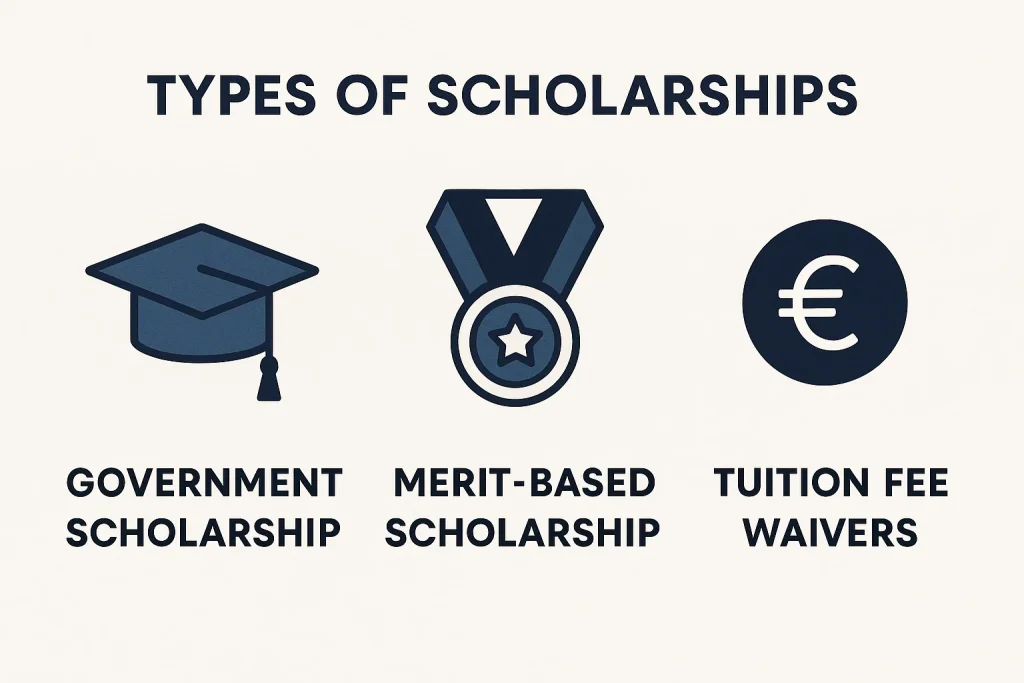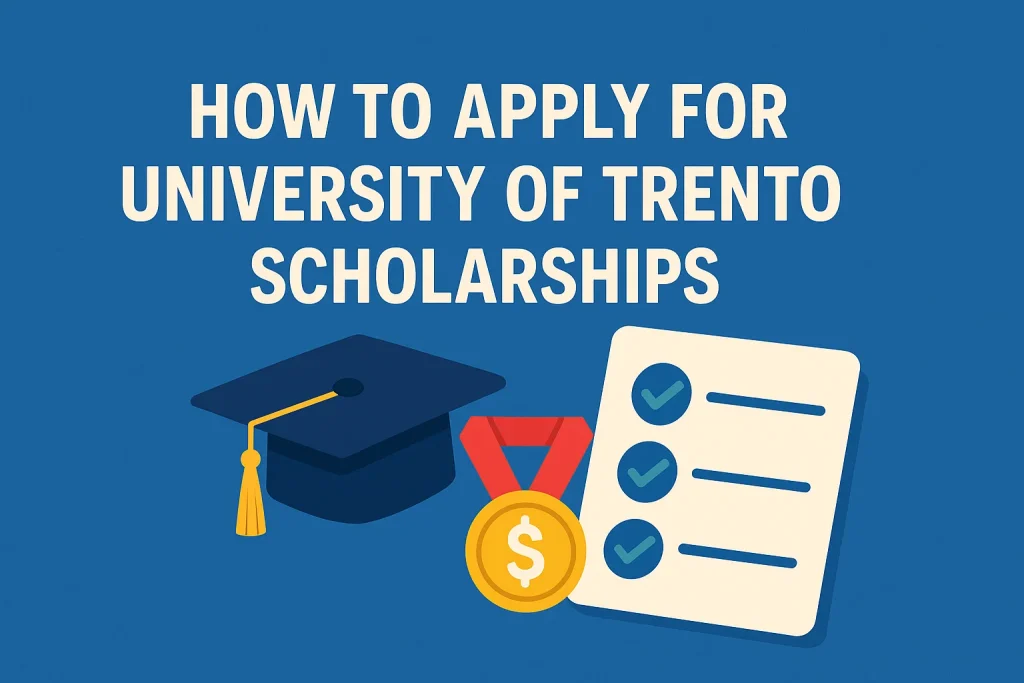When I first came across the University of Trento during my hunt for European scholarship opportunities, I had no idea it would turn out to be such a rewarding discovery. Nestled in the heart of northern Italy, this university blends academic excellence with a breathtaking setting—think medieval architecture, snow-capped mountains, and world-class research all in one place.

But what truly sets Trento apart isn’t just the scenery or the prestige—it’s the university’s deep commitment to welcoming international students through generous scholarship programs. Whether you’re aiming for a Bachelor’s, Master’s, or even a PhD, there’s likely a financial aid option designed with you in mind. And trust me, these aren’t just token gestures; many of them cover tuition fees entirely and offer living stipends too.
As someone who’s spent years researching global education systems and guiding students through the maze of applications, I’ve seen how crucial the right scholarship can be—not just financially, but emotionally. It’s the difference between chasing your dreams and shelving them.
So in this guide, I’m going to walk you through everything you need to know about University of Trento scholarships for 2025–2026—from the types of funding available to how you can increase your chances of getting one. If studying in Italy has ever crossed your mind, this might just be the opportunity you’ve been waiting for.

Types of Scholarships Available at the University of Trento
The University of Trento offers a wide variety of scholarships that make studying here much more affordable—especially for international students like you and me. What stood out to me the most was how tailored these scholarships are to different levels of study and student backgrounds.
Here’s a quick breakdown of the main types you should know:
1. Opera Universitaria Scholarships
These are regional scholarships funded by Opera Universitaria Trento, a local student welfare agency. They’re based on both financial need and academic merit. I’ve seen students receive full tuition coverage, free meals, and even free housing through this program.
2. UniTrento International Scholarships
These are offered directly by the University of Trento to attract high-achieving students from abroad. What I love about this program is how transparent it is. If you’re accepted into a top Master’s or Bachelor’s program, you’re automatically considered for these scholarships—no extra forms needed.
3. Invest Your Talent in Italy
This is a national initiative led by the Italian Ministry of Foreign Affairs that partners with Trento. It targets students from select countries and includes tuition waivers, internships, and a monthly stipend. If you’re career-focused, this one’s a hidden gem.
4. MAECI Scholarships
Also funded by the Italian government, MAECI Scholarships support students who want to pursue postgraduate degrees in Italy. These are merit-based and usually include tuition, health insurance, and €900 per month for living expenses.
Who Can Apply?
One of the things I really appreciate about Trento is how inclusive their scholarship programs are. You don’t have to be fluent in Italian or come from an EU country to be eligible. In fact, the majority of international scholarships are designed for non-EU students like me.
Here’s a quick look at who can apply:
- Bachelor’s Students: If you’re finishing high school and have strong academic records, you’re in.
- Master’s Students: Most international Master’s programs are taught in English. So if you’ve completed a Bachelor’s degree (in any country) and meet the GPA requirements, you’re eligible.
- PhD Students: These scholarships are often tied to funded research projects. If you have a Master’s and want to dive into academic research, Trento could be a great fit.
What’s more, scholarships like Opera Universitaria consider your family income—not just your grades—making it easier for students from low-income backgrounds to qualify.
To be safe, always double-check the official UniTrento eligibility guidelines for the specific program you’re applying to.
Scholarship Benefits and Coverage
Now, let’s talk about what you actually get. Because honestly, this is where Trento outshines many other European universities. The financial support is generous, and it covers more than just your tuition fees.
Here’s a simple table to show what most major scholarships cover:
| Scholarship Type | Tuition Fees | Monthly Stipend | Housing Support | Other Benefits |
| Opera Universitaria | Full or Partial | €2,000–€5,000/year | Yes | Free meals, transportation discounts |
| UniTrento International | Full or Partial | Up to €7,200/year | Case-by-case | Language support, mentorship |
| Invest Your Talent in Italy | Full | €900/month | Yes | Internship with Italian companies |
| MAECI Scholarship | Full | €900/month | No | Health insurance, access to cultural events |
From my own experience helping students apply, I can tell you that the combination of free housing and food support through Opera Universitaria is a total game-changer. It lets you focus on your studies instead of constantly worrying about rent or groceries.
These scholarships also boost your resume. Getting one shows you’re competitive and globally minded—something future employers and grad schools really value.

How to Apply for University of Trento Scholarships
I know the word “application” can feel overwhelming, especially when you’re applying from abroad. But don’t worry—the process at the University of Trento is more straightforward than most people think. I’ve helped several students go through it, and here’s how I usually guide them.
Step-by-Step Application Process
- Choose Your Program
First, head to the UniTrento international programs page and pick the Bachelor’s or Master’s program that suits you. Make sure the course is open to international students. - Check Scholarship Availability
Some programs automatically consider you for scholarships when you apply. Others, like Opera Universitaria, need a separate form. Always read the fine print on the program’s page. - Create an Online Account
Register on the UniTrento Application Portal and fill out your personal details. The portal is user-friendly—even if English isn’t your first language. - Upload Your Documents
You’ll need to upload scanned copies of your transcripts, passport, CV, and a few more documents (I’ll explain these in the next section). - Submit Before the Deadline
Once everything is in, click submit and wait for confirmation. Some scholarships may also require a video interview or written motivation letter.
That’s it! The whole thing takes about 2–3 hours if you’ve prepared your documents ahead of time.
Documents Required for Application
Having the right documents is just as important as meeting the deadline. I’ve seen students get rejected just because they missed one file. So double-check this list and keep your files ready before you even start the application.
Key Documents You’ll Need:
- Valid Passport
Make sure it’s not expired. You’ll need a clear scanned copy. - Academic Transcripts
These should be in English or Italian. If they aren’t, get them translated by a certified translator. - Proof of English Proficiency
Most programs accept IELTS or TOEFL scores. A B2 level is usually the minimum, but some scholarships prefer higher. - Curriculum Vitae (CV)
Use the Europass format to make things easier. - Motivation Letter
This is your chance to shine. Talk about your goals, why you chose Trento, and how the scholarship will help you grow. - Financial Documents (for need-based scholarships)
Opera Universitaria may ask for proof of family income or a bank statement.
Optional but Helpful:
- Letters of recommendation
- Portfolio (for design or art programs)
- Research proposal (for PhD)
Tip from me: Name your files clearly—like “Transcript_BSc_JohnDoe.pdf.” It makes everything easier when uploading.
Important Deadlines for 2025–2026
Missing a deadline can cost you your spot—and your scholarship. So let me break down the key dates I always mark on my calendar when helping students apply to Trento.
Application & Scholarship Deadlines (2025–2026)
| What | Deadline |
| UniTrento Master’s Application | January 31, 2025 |
| UniTrento Bachelor’s Application | April 15, 2025 |
| Opera Universitaria Scholarship | August 30, 2025 |
| MAECI & Invest Your Talent in Italy | Usually March–May 2025 (check official site) |
⚠️ Important: These dates can shift slightly each year. Always confirm deadlines on the University of Trento’s admissions calendar.
My advice? Start your application at least two months in advance. That gives you enough time to fix issues, get your documents in order, and avoid the stress of last-minute problems.
Let me know when you’re ready to continue with the next part: Tips to Increase Your Chances of Getting a Scholarship, Cost of Living in Trento, and Living as an International Student.
Tips to Increase Your Chances of Getting a Scholarship
I’ve seen a lot of scholarship applications over the years, and let me tell you—small details can make a big difference. If you want to stand out, here are the tips I always give my students.
1. Apply Early
Scholarships like Opera Universitaria or MAECI often close months before the semester starts. The earlier you apply, the better your chances.
2. Write a Strong Motivation Letter
This is your chance to speak directly to the selection board. Don’t just repeat your resume. Instead, tell a clear, personal story. Show how the scholarship will help you reach your goals and why you chose Trento.
3. Keep Your Grades High
Many merit-based scholarships look at your academic record first. A strong GPA can push your application to the top of the list.
4. Highlight Extra Activities
Scholarship panels love students who do more than just study. Volunteer work, sports, or community projects show leadership and passion.
5. Get a Great Recommendation Letter
Pick someone who knows you well—like a teacher or mentor—and can talk about your strengths honestly.
6. Double-Check Your Application
I always tell students: proofread everything twice. Typos or missing files can ruin even the best application.
Cost of Living in Trento
One of the things I love most about Trento is how student-friendly it is. It’s not as expensive as cities like Milan or Rome, but it still offers great quality of life. That said, budgeting is key.
Monthly Cost Breakdown (in Euros)
| Expense | Estimated Cost (€) |
| Rent (shared apartment) | 250–400 |
| Food & Groceries | 150–250 |
| Transportation (local) | 20–35 (with student card) |
| Internet & Utilities | 50–70 |
| Personal & Leisure | 100–150 |
| Total | 570–900 |
These numbers are based on my experience helping students in Trento over the years. Costs can vary depending on your lifestyle, but it’s possible to live comfortably on €700–800/month.
👉 Learn more about living costs from Numbeo’s Trento page.
Living as an International Student in Trento
When I first visited Trento, I was surprised by how welcoming it felt. It’s a small city with a big heart—and it’s built for students.
What Makes Trento Special
- Safe and Peaceful
Trento ranks as one of the safest cities in Italy. That’s a big relief for both students and their families. - Stunning Nature
The Dolomites are right at your doorstep. If you love hiking, skiing, or just mountain views, you’ll feel right at home. - Active Student Life
From international student events to local festivals, there’s always something happening. Groups like ESN Trento make it easy to meet people and get involved. - Public Transport
The city is small enough to walk or bike, but it also has a great bus system. Students can get a low-cost transport card for easy travel. - Cultural Blend
Trento is part of a bilingual region (Italian and German), so you’ll hear different languages and experience a mix of cultures.
Tip from me: Learn a few basic Italian phrases. Most locals speak English, but using a little Italian goes a long way in making friends and settling in.
Frequently Asked Questions (FAQs)
1. Can I work part-time while studying in Trento?
Yes, you can! As an international student in Italy, you’re allowed to work up to 20 hours per week during the semester and full-time during holidays. Many students find part-time jobs in cafes, shops, or even on campus. Check Study in Italy’s work rules for more.
2. Do I need to know Italian to study at the University of Trento?
Not necessarily. Many Master’s and some Bachelor’s programs are taught entirely in English. But I still recommend learning some Italian—it helps with daily life and makes the experience more rewarding.
3. What is the average acceptance rate for scholarships?
There’s no fixed number, but based on my research and past experience, the Opera Universitaria and other public scholarships in Trento have moderate to high acceptance rates, especially if you apply early and meet all the requirements.
4. Are housing and meals included in the scholarship?
It depends. Some scholarships like the Opera Universitaria cover free or subsidized meals, accommodation, and even transportation discounts. Others provide only a cash grant. Always read the fine print on the official scholarship site.
5. How competitive is the scholarship application process?
It’s competitive, but not impossible. If you have good grades, a clear goal, and submit everything on time, you have a strong chance. I’ve seen students with average scores win scholarships just because they told their story well.
Final Thoughts
If you’ve made it this far, I know you’re serious about studying at the University of Trento. And that’s a great choice.
Trento isn’t just another university town. It’s a place where high-quality education, breathtaking nature, and a tight-knit international community come together.
The scholarship opportunities here aren’t just generous—they’re designed to support you, both financially and personally. From tuition waivers to meal plans and housing, they give you room to breathe and focus on your studies.
If I could give you one final piece of advice, it’s this:
Start early, be honest in your application, and don’t be afraid to ask for help. Use official websites, connect with past students, and most importantly, believe in yourself.